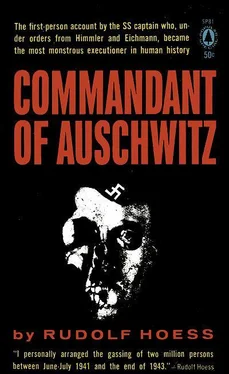In my opinion the necessary extension of living space for the German people could have been obtained by peaceful means. However, I am convinced that wars can never be prevented, and that others will occur in the future.
In order to disguise a policy of force it is necessary to use propaganda so that a clever distortion of all the facts, the policies, and measures of the rulers of the state can be made palatable. Terrorism must be used from the outset, to stifle all doubt and opposition.
In my view, real opponents can be overcome by presenting the better alternative.
Himmler was the crudest representative of the leadership principle. Every German had to subordinate himself un-questioningly and uncritically to the leaders of the state, who alone were in a position to understand the real needs of the people and to direct them along the right path.
Anyone who did not submit to this principle must be eliminated from public life. With this purpose in mind Himmler trained and formed his SS, and created the concentration camps, the German police, and the Reich Security Head Office.
In Himmler’s view, Germany was the one state in Europe that had the right to exercise supremacy. All the other countries were second-rate. The predominantly Nordic races were to be favorably treated, with the aim of incorporating them into Germany. The Eastern races were to be split up, to be made insignificant, and to become slaves.
The concentration camps before the war had to be depositories in which to segregate opponents of the state. The fact that they incidentally became re-education centers for asocials of every kind, and in this performed valuable service to the country as a whole, was a consequence of the cleaning-up process.
Similarly, they were necessary for the preventive war on crime.
When war came, they were turned into centers for the extermination, by direct or indirect means, of those elements in the conquered countries which continued to oppose their conquerors and oppressors.
I have already repeatedly expressed my attitude regarding the “enemies of the state.”
But the extermination of those population elements which remained hostile was in any case a mistake. If the peoples of the occupied territories had been treated with decency and common sense, their resistance movements could have been reduced to insignificance. There would then have been few serious opponents left.
I also see now that the extermination of the Jews was fundamentally wrong. Precisely because of these mass exterminations, Germany has drawn upon herself the hatred of the entire world. It in no way served the cause of anti-Semitism, but on the contrary brought the Jews far closer to their ultimate objective.
The Reich Security Head Office was only the executive, the long arm, of Himmler the police chief. The Reich Security Head Office and the concentration camps were only the tools that were used to carry out the wishes of Himmler, or the intentions of Adolf Hitler, as the case might be.
In these pages, and also in my sketches of the leading personalities concerned, [105]I have sufficiently explained how the horrors of the concentration camps could come about.
I for my part never sanctioned them. I myself never maltreated a prisoner, far less killed one. Nor have I ever tolerated maltreatment by my subordinates.
When during the course of this investigation I have had to listen to descriptions of the fearful tortures that were enacted in Auschwitz and also in other camps, my blood runs cold. I knew very well that prisoners in Auschwitz were ill-treated by the SS, by their civilian employers, and not least of all by their fellow prisoners. I used every means at my disposal to stop this. But I could not. The commandants of other camps, who had a similar outlook to mine, but whose camps were far smaller and far easier to supervise, found themselves equally impotent in this respect.
Nothing can prevail against the malignancy, wickedness, and brutality of the individual guard, except keeping him constantly under one’s personal supervision. And the worse the guards and supervisory personnel, the more they oppress the prisoners. The truth of this has been abundantly confirmed to me during my present imprisonment.
In the British Zone I had plenty of opportunity to study the three categories of guards at very close quarters. At Nuremberg maltreatment by individual guards was impossible, since there all the prisoners were under the permanent supervision of the prison duty officers. Even while changing planes in Berlin I only met with ill-treatment from strangers encountered by chance in the lavatory.
In the Warsaw prison, which, so far as I was able to observe and judge from the confines of my cell, was conducted on strict and exact lines, there was one supervisor, and only one who, as soon as he came on duty, ran from cell to cell, wherever there were Germans, and proceeded to beat them up indiscriminately. Apart from von Burgsdorff, who had his face slapped on several occasions, every German got a taste of his fists. He was a young man of eighteen or twenty, whose eyes gleamed with a fanatical hatred. He said he was a Polish Jew, though he did not look like one. He certainly never grew tired of beating us. His activities were only interrupted by signals from his colleagues warning him of the approach of a stranger. I am certain that none of the higher officials nor the warden of the prison approved of his behavior. I was occasionally asked by visiting officials how I was treated, but I always kept quiet about this, because he was the only man who acted in this way. The other supervisors were more or less strict and unfriendly, but none of them laid a hand on me. So it can be seen that even in a small prison the warden is unable to prevent such behavior; how much more difficult was it in a concentration camp the size of Auschwitz!
I was certainly severe and strict. Often perhaps, when I look at it now, too severe and too strict.
In my disgust at the errors and abuses that I discovered, I may have spoken many hard words that I should have kept to myself. But I was never cruel, and I have never maltreated anyone, even in a fit of temper. A great deal happened in Auschwitz that was done ostensibly in my name, under my authority and on my orders, which I neither knew about nor sanctioned. But all these things happened in Auschwitz and so I am responsible. For the camp regulations say: the camp commandant is fully responsible for everything that happens in his sphere.
My life is now nearly at its end. I have given an account here of everything that was important in that life, of all those things that impressed me most strongly and which affected me most deeply. It is the absolute truth, as I saw it and experienced it. I have omitted much that is irrelevant, and much I have forgotten, and much I can no longer remember very clearly.
I am no writer and I have never been particularly skilled with the pen. I am sure that I must have frequently repeated myself, and perhaps I have not always made myself sufficiently clear.
I have also lacked the calm and mental balance required for a task of this nature.
I have written down what came to my mind, often not in sequence, but nothing is invented.
I have described myself as I was and as I am.
I have led a full and varied life. I have followed my star wherever it led me. Life has given me some hard and rough knocks, but I have always managed to get along. I have never given in.
Since returning from the war to which I went as a youngster and from which I came back a man, I have had two lights to guide me: my fatherland and, later, my family. My unalterable love for my country brought me into the NSDAP and the SS.
I regarded the National Socialist attitude to the world as the only one suited to the German people. I believed that the SS was the most energetic champion of this attitude and that the SS alone was capable of gradually bringing the German people back to its proper way of life.
Читать дальше












